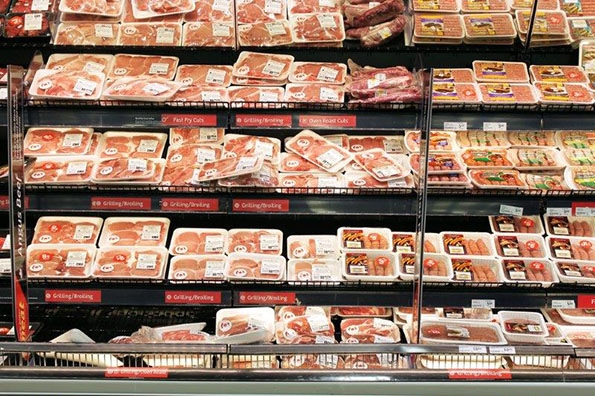Non-GMO meat labels allowed with third party verification
Legislative Preview covers GMO meat labels; White House moving forward on TPP; ag exports on the rise; seed, chemical consolidation topic of Senate hearing.

The USDA’s Food Safety and Inspection Service has issued a notice, “Voluntary Labeling Statements that Bioengineered or Genetically Modified Ingredients or Animal Feed were Not Used in Meat, Poultry or Egg Products,” to assist companies who want to label meat, poultry, or egg products as non-GMO.
Companies will be able to use the label if they can prove the claim with third-party verification. FSIS gave examples of acceptable labeling claims: “Raised on a diet containing no genetically engineered ingredients;” “Pasture raised beef fed a vegetarian diet with no bioengineered ingredients;” and “Derived from beef fed no GMO feed.”
The GMO bill signed into law by President Obama clearly states that meat, dairy and eggs are not eligible for GMO disclosure; however some food companies want the option to label their products as coming from animals that were never fed genetically modified feed.
White House continues to move forward on TPP
Even as both presidential candidates and a number of Congressmen continue to state their objections or concerns with the Trans-Pacific Partnership trade agreement, President Barack Obama continues to move forward on his efforts to have Congress approve TPP before the end of his term.
He recently submitted to Congress a draft Statement of Administrative Action, notifying Congress his intentions to present legislation to implement TPP. The statement details the necessary statutory changes and administrative actions needed to implement the agreement. It is not expected the administration will submit the final TPP implementing legislation until after the election. Senate Majority Leader, Mitch McConnell (R-KY), said last week the Senate would not consider TPP and it will have to wait for the new administration. TPP involves 12 countries and represents 40% of the global economy.
Ag exports estimated to reach $133 billion
U.S. agricultural exports are estimated to reach $133 billion in FY ’17, up $6 billion over last fiscal year. This reverses the trend of the past two years of declining U.S. agricultural exports. It will be the sixth largest level of exports on record according to USDA’s latest forecast on the “Outlook for U.S. Agricultural Trade.”
The increase is primarily due to higher exports of oilseeds and products, horticultural products, cotton, livestock, dairy and poultry. Some of USDA’s projections include:
♦ China will surpass Canada as the largest market for U.S. agricultural products primarily due to increased soybean, tree nuts and pork exports.
♦ Oilseeds and product exports will reach $31 billion, up $2.7 billion. This is due to record soybean export volume and higher unit values.
♦ Horticultural products are forecast at $34 billion, an increase of $1.4 billion, led by tree nuts.
♦ Livestock, dairy and poultry products exports are up $800 million, primarily due to higher poultry and dairy exports.
♦ Grain and feed exports are forecast unchanged at $29.3 billion. This is a result of higher wheat and corn exports offset by reductions in sorghum exports.
♦ U.S. agricultural imports are forecast to reach $113.5 billion, an increase of $400 million over FY ’16.
♦ U.S. agricultural trade surplus is estimated at $19.5 billion, an increase of $5.6 billion over last fiscal year.
Secretary of Agriculture Tom Vilsack says, “Exports are responsible for 20% of U.S. farm income, also driving rural economic activity and supporting more than one million American jobs on and off the farm. The United States has the opportunity to expand those benefits even further through passage of new trade agreements such as the Trans-Pacific Partnership. Such agreements are key to a stable and prosperous farm economy, helping boost global demand for U.S. farm and food products, increasing U.S. market share versus our competitors, and ensuring that our farmers and ranchers have stable and predictable markets for the quality goods they produce.”
Hearing will center on seed and chemical consolidation
Sen. Chuck Grassley (R-IA), chairman of the Senate Judiciary Committee, announced the Senate Judiciary Committee will hold a hearing on the increasing consolidation within the seed and chemical industry. Grassley says, “The seed and chemical industries are critical to agriculture and the nation’s economy, and Iowans are concerned that this sudden consolidation in the industry could cause rising input costs in an already declining agriculture economy.”
The hearing will focus on the transactions currently being reviewed by antitrust regulators, and the current trend in consolidation of the seed and chemical industries. The hearing is expected to be late September with witnesses from companies that are under review by antitrust regulators, consumers and antitrust experts will all be represented at the hearing.
The Committee on Foreign Investment in the United States approved China National Chemical Corp.’s proposed $43 billion purchase of Syngenta last Monday.
About the Author(s)
You May Also Like



